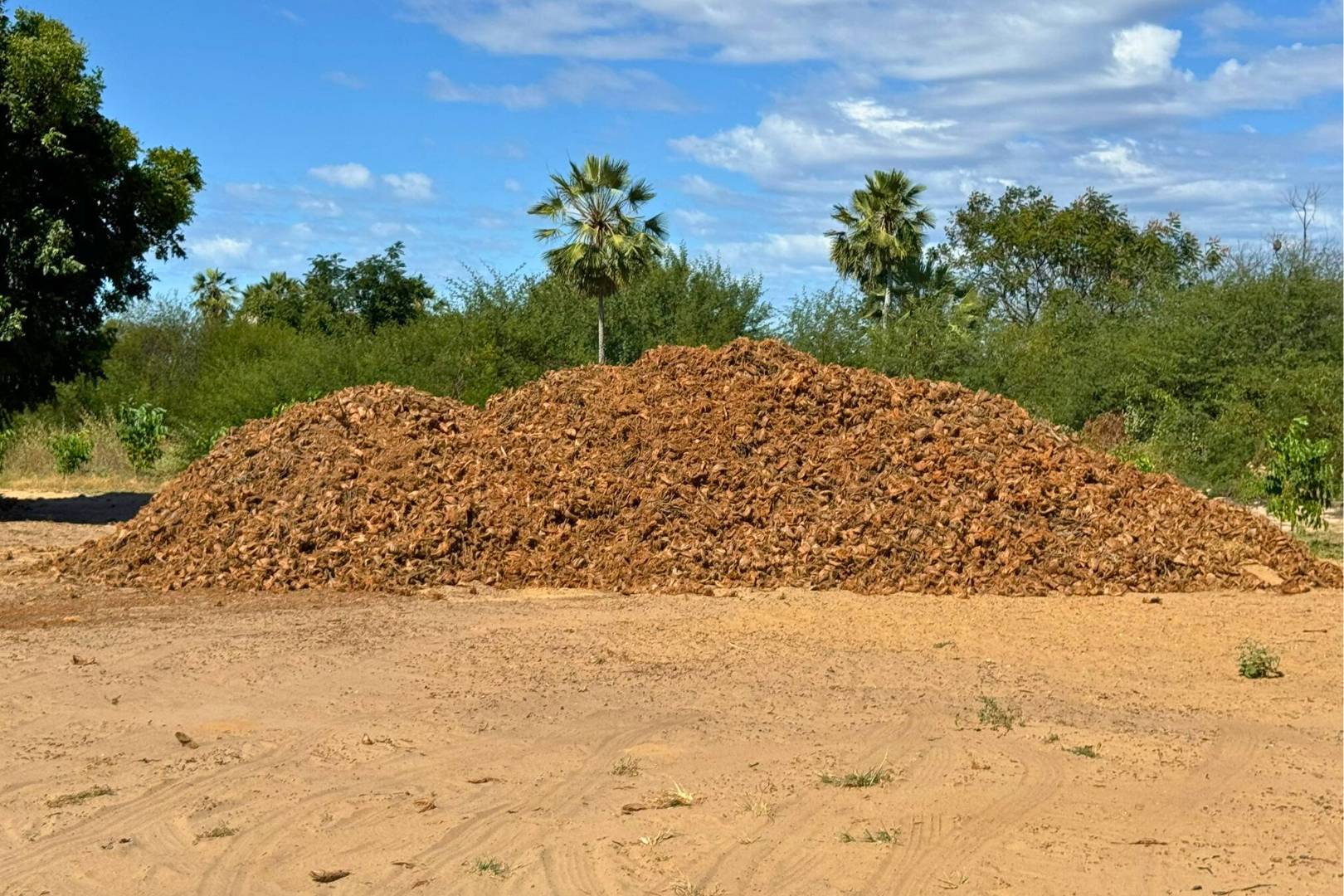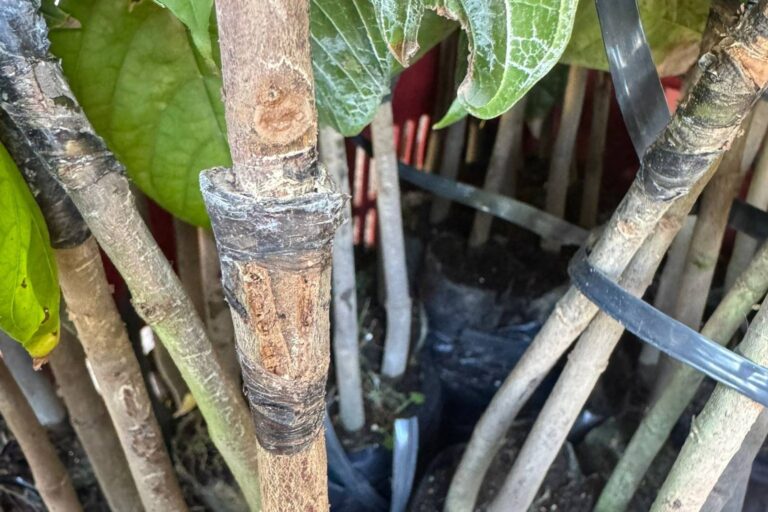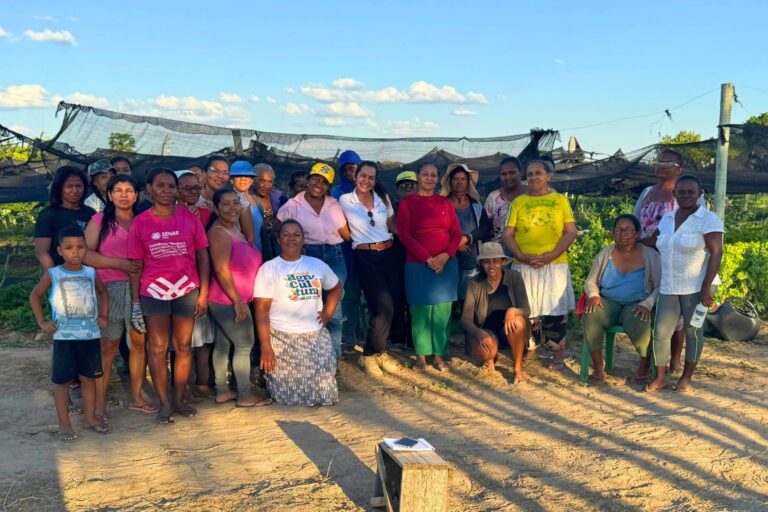One of the methods that has proved successful for us is the creation of fertilizer from coconut husks, an abundant and eco-friendly resource on our farm. We use this organic fertilizer to protect and nurture our cacao and coconut crops, especially during their early growth stages. We’ve also found coconut husk fertilizer is really good at moisture retention, something that is essential in the semi-arid environment of our farm.
There isn’t much additional labor when you consider the husks would need to be transported somewhere, and we would also need to transport more fertilizer in place of the coconut husks. So, there’s not a lot of extra work to simply reuse what we have. It’s possible that it may save a little time, as the material is already here on our farm. The process of creating fertilizer from coconut husks mostly requires patience to carefully collect and compost the materials.
In this blog post, we’ll tell you how we transform our coconut husks into fertilizer, and the many benefits you’ll receive from making your own organic fertilizer.
The Journey from Coconut Husk to Organic Fertilizer
1. Collection and Preparation of Coconut Husks
The process begins with the collection of coconut husks, a byproduct of our coconut harvest. Instead of discarding these husks, we repurpose them into a valuable resource. The first step is to dry the husks thoroughly. In our semi-arid climate, natural sun drying is effective and energy-efficient.
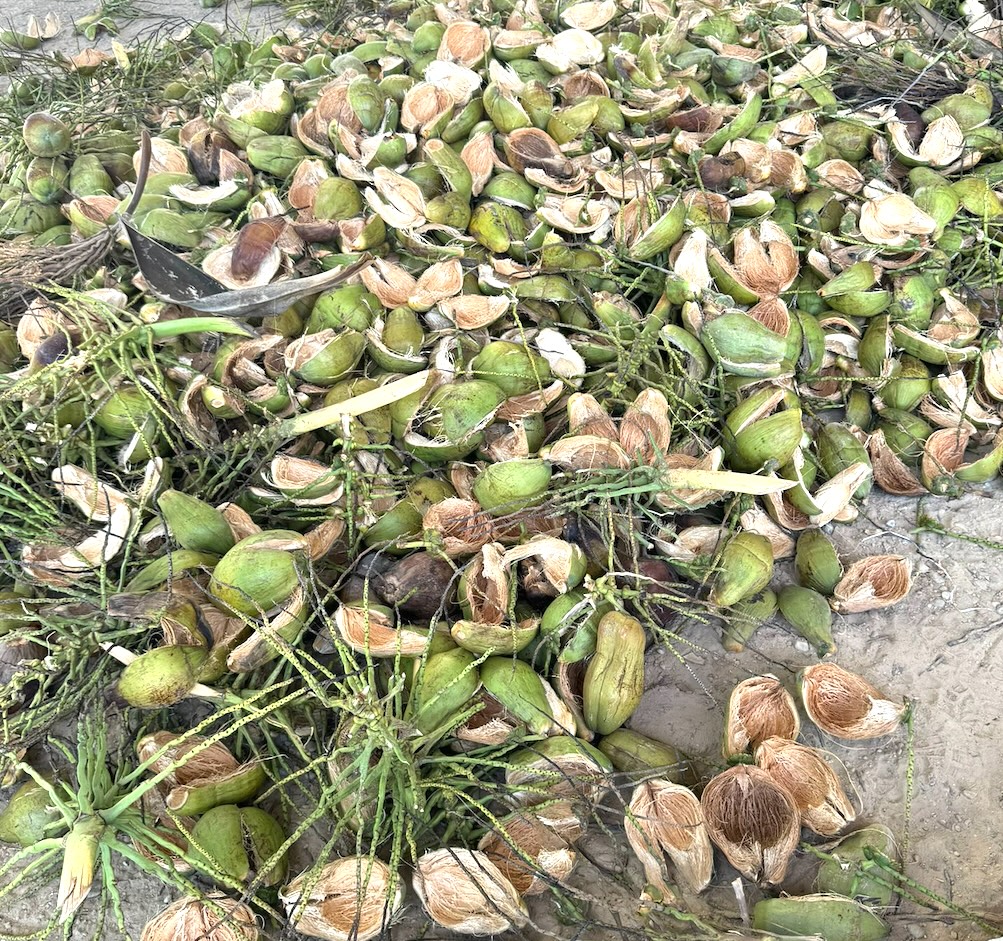
2. Chipping and Grinding
Once dried, the husks are chipped and ground into smaller pieces. This process increases the surface area, making it easier for microorganisms to break down the material during composting. The resulting husk chips are rich in lignin and cellulose, key components that contribute to soil health.
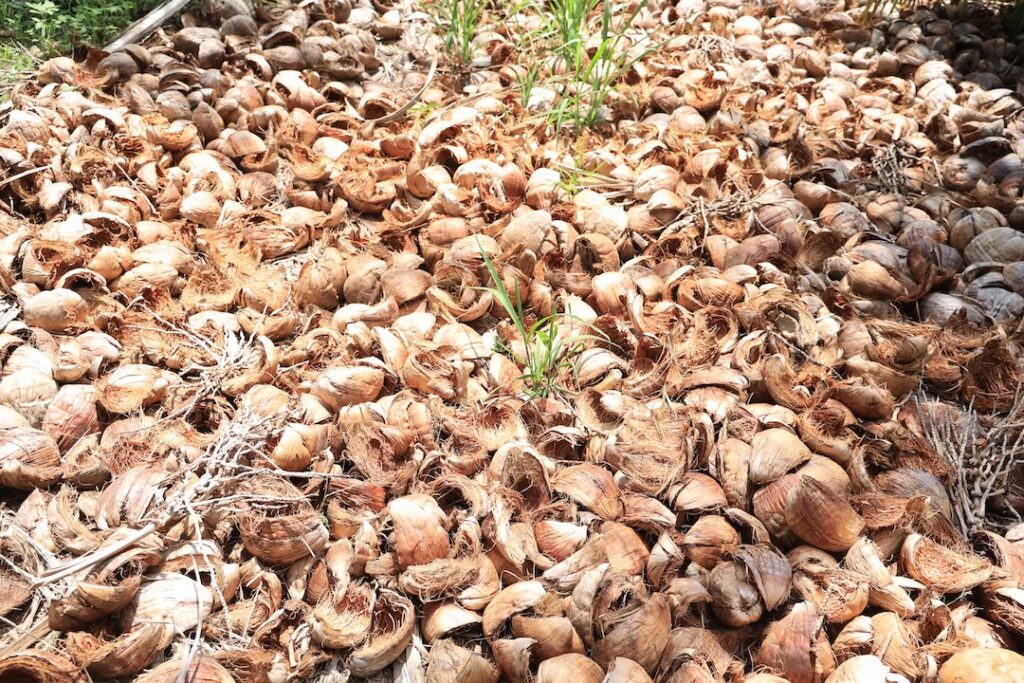
3. Composting Process
The ground husks are then mixed with other organic materials, such as green waste and manure, to create a balanced compost pile. This mixture undergoes a controlled composting process, where it is regularly turned to ensure adequate aeration and moisture levels. The decomposition process is accelerated by the natural heat generated within the pile, breaking down the husks into nutrient-rich compost over several weeks to months. After some experience creating the organic fertilizer in your farm or garden, you will know when it’s ready to use.
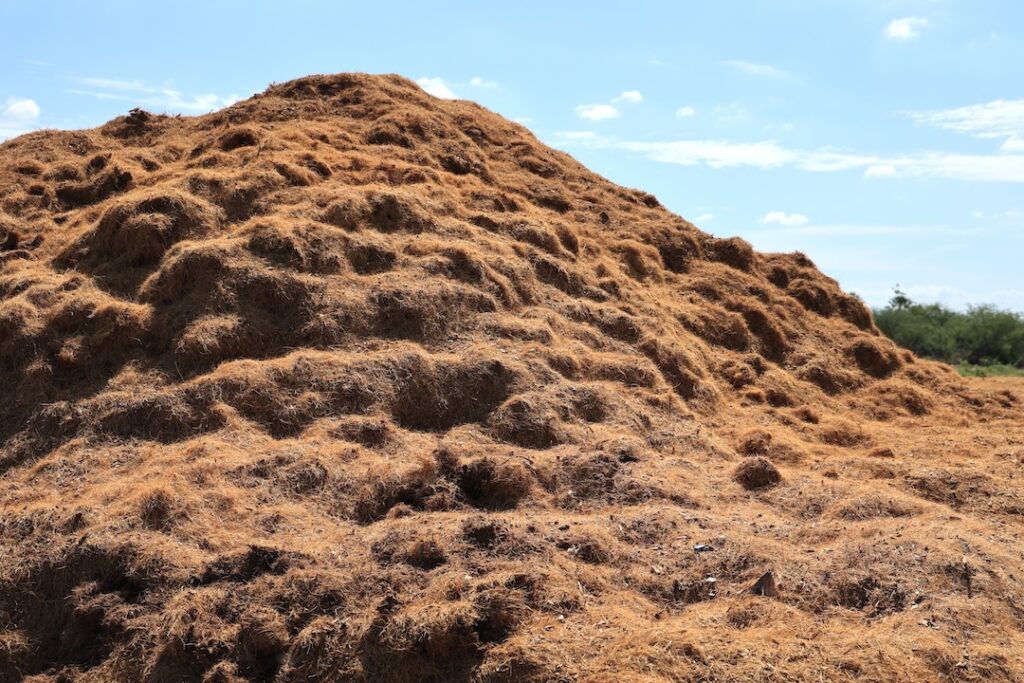
Benefits of Coconut Husk Fertilizer
1. Nutrient-Rich Composition
Coconut husk fertilizer is rich in essential nutrients such as potassium, phosphorus, and magnesium, which are vital for the healthy growth of cacao and coconut plants. These nutrients help in root development, flowering, and fruit production, ensuring robust and resilient crops.
2. Improved Soil Structure
The fibrous nature of coconut husks enhances soil structure by increasing aeration and improving drainage. This is particularly beneficial in our semi-arid environment, where soil compaction can be a challenge. The improved soil structure promotes healthy root growth and prevents waterlogging.
3. Excellent Moisture Retention
One of the standout benefits of coconut husk fertilizer is its exceptional moisture retention capabilities. The husk fibers act like sponges, absorbing and holding water, which is gradually released to the plants. This property is crucial in our semi-arid climate, where water conservation is essential. By retaining moisture, the coconut husk fertilizer helps our cacao and coconut plants withstand periods of drought.
Application in Early Growth Stages
1. Seedling Stage
During the seedling stage, young plants are particularly vulnerable and require a steady supply of nutrients and moisture. Coconut husk fertilizer provides a gentle, organic nutrient source that supports early root development and helps seedlings establish a strong foundation. The moisture-retentive properties ensure that young plants do not experience water stress, promoting healthy growth.
2. Transplanting
When transplanting seedlings to the field, the addition of coconut husk fertilizer to the planting hole can significantly reduce transplant shock. The improved soil structure and moisture retention create an ideal environment for the young plants to adapt and thrive. This practice enhances the survival rate and accelerates the establishment of the transplants.
You can read more about the early stages of coconut tree growth in our recently published article.
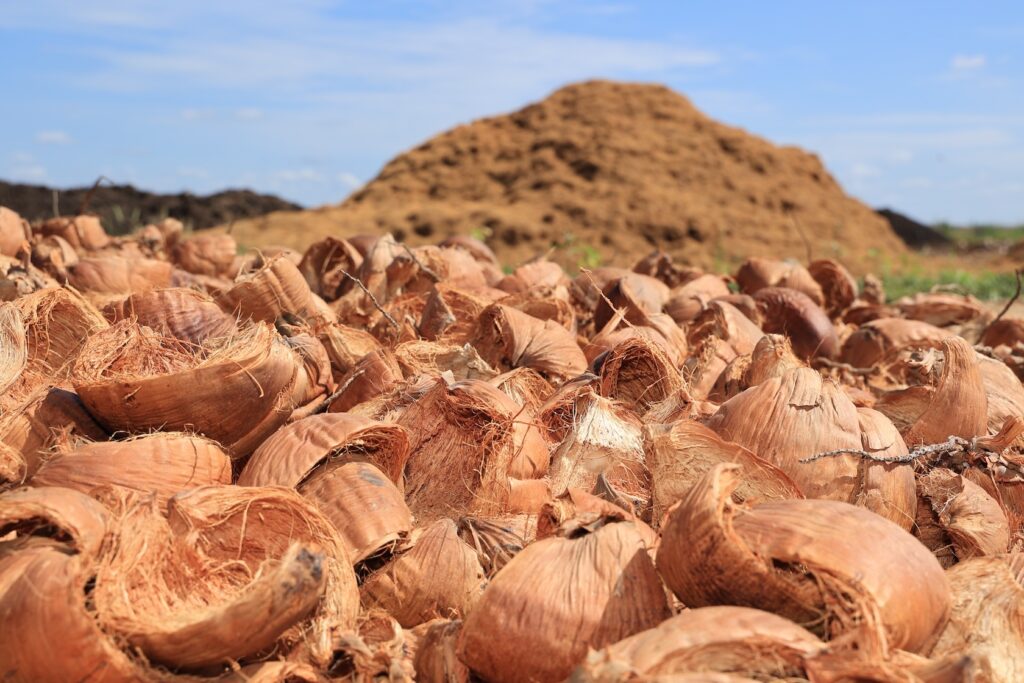
Long-Term Benefits for Cacao and Coconut Crops
1. Sustainable Soil Health
Using coconut husk fertilizer contributes to the long-term health of our soil. The organic matter decomposes slowly, providing a sustained release of nutrients over time. This reduces the need for chemical fertilizers, promoting a more sustainable and environmentally friendly farming approach.
2. Enhanced Crop Resilience
Crops grown with coconut husk fertilizer exhibit increased resilience to environmental stresses. The improved soil structure and moisture retention help plants endure drought conditions, while the rich nutrient profile boosts their natural defense mechanisms against pests and diseases. This results in healthier, more productive cacao and coconut plants.
3. Environmental Impact
Repurposing coconut husks into fertilizer aligns with our commitment to sustainability. By diverting husks from waste streams and transforming them into a valuable agricultural input, we reduce our environmental footprint. This practice also supports the principles of a circular economy, where agricultural byproducts are recycled and reused. It’s a triple benefit: reducing costs for increased profitability, reducing byproducts and chemicals so it’s better for the environment, and using organic materials is also better for the health of our team.
Innovation and Collaboration
At Peirot, we continually seek innovative ways to enhance our farming practices. Our coconut husk fertilizer initiative is a testament to this commitment. We collaborate with local agricultural experts and researchers to refine our composting techniques and explore new applications for coconut husk products. This collaborative approach ensures that we stay at the forefront of sustainable agriculture.
Conclusion
Creating fertilizer from coconut husks is a sustainable and effective solution that benefits both our cacao and coconut crops. From improving soil structure and nutrient availability to enhancing moisture retention and crop resilience, this organic fertilizer plays a crucial role in our farming success. By embracing innovative practices and prioritizing sustainability, Peirot is nurturing a greener future for our farm and contributing to the broader goals of environmental stewardship and agricultural sustainability. We invite you to join us on this journey and discover the transformative power of coconut husk fertilizer in your farm or garden!

